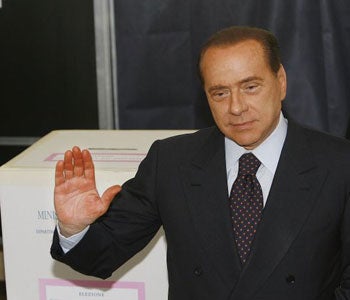Your support helps us to tell the story
From reproductive rights to climate change to Big Tech, The Independent is on the ground when the story is developing. Whether it's investigating the financials of Elon Musk's pro-Trump PAC or producing our latest documentary, 'The A Word', which shines a light on the American women fighting for reproductive rights, we know how important it is to parse out the facts from the messaging.
At such a critical moment in US history, we need reporters on the ground. Your donation allows us to keep sending journalists to speak to both sides of the story.
The Independent is trusted by Americans across the entire political spectrum. And unlike many other quality news outlets, we choose not to lock Americans out of our reporting and analysis with paywalls. We believe quality journalism should be available to everyone, paid for by those who can afford it.
Your support makes all the difference.Conservative media mogul Silvio Berlusconi said today he "feels great responsibility" after winning a third term as Italy's prime minster.
Centre-left rival Walter Veltroni conceded defeat after early results from a two-day election projected a big majority in both houses of parliament for the 71-year-old media magnate.
"I called the leader of the People of Freedom (PDL), Silvio Berlusconi, to acknowledge his victory and wish him luck," the 52-year-old former mayor of Rome told reporters outside his party's headquarters.
Berlusconi, who has vowed to cut taxes and rein in Italy's huge debt, had been widely expected to win the lower house. But a strong Senate majority would help him push through structural reforms needed to pull Italy away from the brink of recession.
Many Italians are deeply disillusioned with politics and doubt any government can quickly cure the ills of the European's Union's fourth-largest economy.
Pollsters' projected results, based on early results, gave Berlusconi a 99-seat majority in the 630-member lower house and an advantage of at least 22 seats in the Senate, which has 315 elected and seven lifetime senators.
That contrasts with the two-seat majority in the Senate that the last government had under Romano Prodi. Berlusconi had set his sights on a 20-seat majority in the Senate.
His spokesman, Paolo Bonaiuti, called it a "clear and decisive turnaround after the disastrous leftist government" which collapsed in January after 20 months in office.
"From tomorrow the PDL will guarantee a stable government with two main objectives: giving Italy back its serenity and getting it out of the decline and back on the road to growth," Bonaiuti said.
Many Italians went to the polls to elect their 62nd government since World War Two gloomy about chronic political instability and an economy that has long lagged behind its main partners in the EU.
JP Morgan economist Silvia Pepino described Italy's economic problems as "very long-standing and deep-rooted and it's difficult to see any progress in the near term whatever the outcome of the election."
Public morale has been undermined by everything from a garbage crisis in Naples and failed rescue bid for loss-making airline Alitalia to a mozzarella food scare.
Economic growth is expected by the International Monetary Fund to slow to 0.3 percent this year and Italy's debt is the third highest in the world.
Berlusconi did not speak in public after the end of voting, but expressed "deep satisfaction" in a call to his main ally, National Alliance leader Gianfranco Fini, a party source said.
Berlusconi dominates Italian media through his business empire, Mediaset, Italy's largest private broadcaster, and is rated the country's third richest man by Forbes magazine.
He has pledged to slash the debt, cut taxes and liberalise the economy as well as getting tough on crime. But critics say he failed to carry out pledges to revolutionise Italy when prime minister for seven months from April 1994 and from 2001-2006.
The election could mark a watershed in Italian politics, with a handful of parties winning seats rather than more than 20 in the last election. Christian Democratic chief Pierferdinando Casini said the next parliament may have only five parties.
Political analyst Roberto D'Alimonte told state television this would turn Italy into a "normal" European country, "with just two main parties accounting for over 70 percent of the vote".

Join our commenting forum
Join thought-provoking conversations, follow other Independent readers and see their replies
Comments